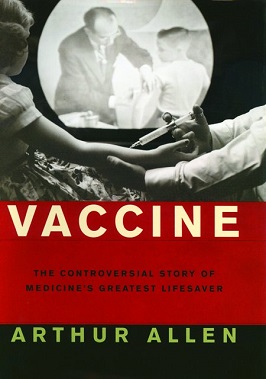Vaccine: The Controversial Story of Medicine's Greatest Lifesaver
Vaccine: The Controversial Story of Medicine's Greatest Lifesaver is a comprehensive exploration of the history, development, and societal impact of vaccines. Vaccines are biological preparations that provide active acquired immunity to a particular infectious disease. They have been a cornerstone of public health since the first successful vaccination against smallpox by Edward Jenner in 1796. Despite their significant role in eradicating and controlling deadly diseases, vaccines have been surrounded by controversies and debates regarding their safety, ethics, and effectiveness.
History[edit | edit source]
The concept of vaccination has its roots in variolation, an early method of immunization that involved the deliberate introduction of smallpox material to induce immunity. Edward Jenner's landmark discovery that cowpox could protect against smallpox marked the birth of modern vaccination. This was followed by the development of vaccines against rabies by Louis Pasteur in the late 19th century, leading to the establishment of the science of immunology.
Throughout the 20th century, scientific advancements facilitated the development of vaccines against a wide array of diseases, including diphtheria, tetanus, pertussis (whooping cough), influenza, polio, measles, mumps, and rubella. The eradication of smallpox in 1980, declared by the World Health Organization (WHO), stands as a monumental achievement in public health, showcasing the power of global vaccination campaigns.
Controversies and Challenges[edit | edit source]
Despite their success, vaccines have faced skepticism and opposition. The anti-vaccination movement, which began in the 19th century, has seen a resurgence in the 21st century, fueled by concerns over vaccine safety, religious beliefs, and philosophical objections. A significant event in the modern anti-vaccine movement was the publication of a now-discredited study in 1998 that falsely linked the MMR (measles, mumps, and rubella) vaccine to autism. This has led to a decline in vaccination rates in some regions, resulting in outbreaks of previously controlled diseases.
Vaccine hesitancy, defined by the WHO as a delay in acceptance or refusal of vaccines despite availability of vaccination services, is a complex issue influenced by factors such as complacency, convenience, and confidence. Addressing vaccine hesitancy requires a multifaceted approach, including public education, policy measures, and engagement with communities.
Future Directions[edit | edit source]
The development of new vaccine technologies, such as mRNA vaccines, offers promising avenues for the prevention of infectious diseases and even non-infectious conditions like cancer. The COVID-19 pandemic has underscored the importance of vaccines in controlling pandemics and highlighted the challenges of vaccine development, distribution, and acceptance on a global scale.
Conclusion[edit | edit source]
Vaccines remain one of the most effective tools for preventing infectious diseases and have saved countless lives. The story of vaccines is one of scientific triumph, but also a reminder of the ongoing challenges in public health. As society continues to grapple with vaccine hesitancy and the ethical considerations of mandatory vaccination policies, the importance of transparent communication, robust scientific evidence, and community engagement has never been more apparent.
Search WikiMD
Ad.Tired of being Overweight? Try W8MD's physician weight loss program.
Semaglutide (Ozempic / Wegovy and Tirzepatide (Mounjaro / Zepbound) available.
Advertise on WikiMD
|
WikiMD's Wellness Encyclopedia |
| Let Food Be Thy Medicine Medicine Thy Food - Hippocrates |
Translate this page: - East Asian
中文,
日本,
한국어,
South Asian
हिन्दी,
தமிழ்,
తెలుగు,
Urdu,
ಕನ್ನಡ,
Southeast Asian
Indonesian,
Vietnamese,
Thai,
မြန်မာဘာသာ,
বাংলা
European
español,
Deutsch,
français,
Greek,
português do Brasil,
polski,
română,
русский,
Nederlands,
norsk,
svenska,
suomi,
Italian
Middle Eastern & African
عربى,
Turkish,
Persian,
Hebrew,
Afrikaans,
isiZulu,
Kiswahili,
Other
Bulgarian,
Hungarian,
Czech,
Swedish,
മലയാളം,
मराठी,
ਪੰਜਾਬੀ,
ગુજરાતી,
Portuguese,
Ukrainian
Medical Disclaimer: WikiMD is not a substitute for professional medical advice. The information on WikiMD is provided as an information resource only, may be incorrect, outdated or misleading, and is not to be used or relied on for any diagnostic or treatment purposes. Please consult your health care provider before making any healthcare decisions or for guidance about a specific medical condition. WikiMD expressly disclaims responsibility, and shall have no liability, for any damages, loss, injury, or liability whatsoever suffered as a result of your reliance on the information contained in this site. By visiting this site you agree to the foregoing terms and conditions, which may from time to time be changed or supplemented by WikiMD. If you do not agree to the foregoing terms and conditions, you should not enter or use this site. See full disclaimer.
Credits:Most images are courtesy of Wikimedia commons, and templates, categories Wikipedia, licensed under CC BY SA or similar.
Contributors: Prab R. Tumpati, MD

